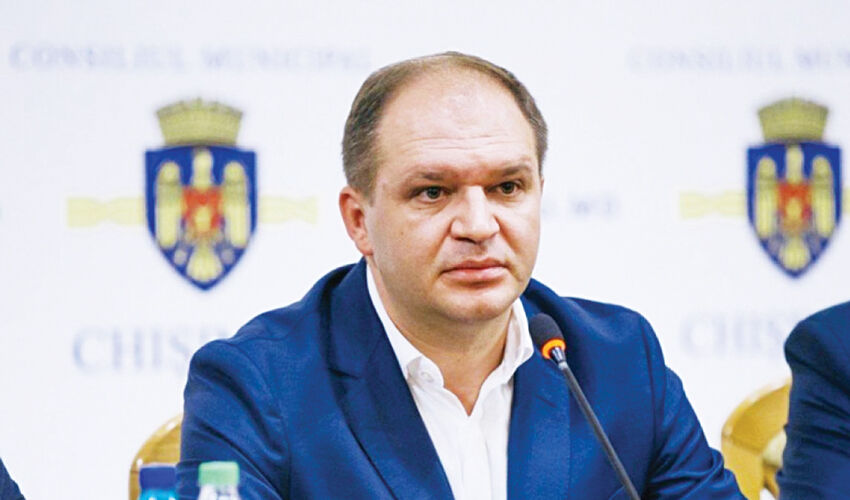
Ion Cheban
The draft budget was tabled seven times during the year, but it was never put to a vote. This was either due to a lack of quorum or to the dissatisfaction of PAS and PSRM advisors that their proposals were being ignored.
The Socialists linked the vote to the demand to include in the budget the costs of heating compensation for vulnerable people. And PAS insisted on financing its initiatives, including the creation of extended day groups in schools, programs to support low-income citizens, etc.
On Wednesday, October 15, the approval of the budget was on the agenda of the Municipal Council meeting. In the morning, Chisinau Mayor Ion Ceban, in a video message on his social network page, once again emphasized that no project, “big or small”, was suspended in the capital this year. And he expressed hope that the municipal councilors “will show political will”.
However, an hour before the meeting, there was a whiff of scandal at City Hall. Councillors from PAS held a press conference where they accused the mayor of non-transparent management of municipal funds. In their opinion, the mayor’s office should have presented a report on the execution of the provisional budget, rather than insisting on its approval retroactively.
Therefore, the MPs did not discuss and vote for the draft budget-2025, but removed the issue from the agenda on the initiative of Adrian Lebedinschi, Councillor of the Party of Socialists (PSRM). The faction believes that there is no need to approve this year’s budget at all, as the legal deadline for presenting the budget for 2026 is approaching.
24 councilors from PAS and PSRM voted in favor of this proposal, while the representatives of MAN, PCRM, Our Party and DA Platform opposed it.
Explaining PAS’ position, the faction’s chairwoman, Zinaida Popa, said that the draft submitted to the vote contained new provisions that had not been discussed before. “Here is just one of the new clauses: financial resources provided for the implementation of projects and municipal programs, which are distributed by the budget manager, in other words, the mayor,” she said. – We are talking about 306 million lei, which he wants to dispose of as he wants. We will not be involved in this.
The Chisinau mayor accused the councilors of political games and sabotage. So the hopes that the councilors will withdraw from the electoral race, calm down and finally discuss the budget, with figures and arguments, were not justified. This begs the question, with the heat of the moment, will councillors be able to agree on a budget for 2026? And if not, on what budget will the capital municipality live and work next year?
Logos Press raised the question of how, why and how many mayoralties in the country today work according to the budgets of the previous year two weeks ago (No. 36 of 04.10.2025). We sent an inquiry to the Ministry of Finance, and the answer came at the end of last week. Specialists described the legislative framework of the temporary budget and its consequences for localities. They also provided statistics.
“For information we note that in 2025 with the interim budget included 16 administrative-territorial units, 3 local budgets of II level and 13 local budgets of I level. As of 10.10.2025, the municipality of Chisinau and 3 administrative-territorial units of level I do not have approved budgets,” the Ministry of Finance reported in its response.
As for the legislative procedure, the experts note: according to the provisions of Article 47, paragraph (2) of the Law on public finances and fiscal responsibility and Article 21 of the Law on local public finances, the mayor’s office develops and submits to the local council of the locality the draft budget for the next year until November 20. The local council shall approve it by December 10.
If the draft is not adopted at least 3 days before the end of the budget year, in accordance with the provisions of Article 23 of the Law on Local Public Finances, the budget administrator shall issue an order to apply a temporary document. Its validity shall be terminated with the entry into force of the annual budget decision, and all operations carried out at the expense of the temporary budget shall be transferred to the account of the approved budget for the current year”.
Accordingly, the current regulatory framework does not limit in time the validity or application of such a budget. According to Article 3, paragraph 2 of the Law No. 436/2006 on local public administration, local authorities have autonomy in decision-making – organizational, managerial and financial, i.e. they have the right to initiative in everything related to the management of local projects, exercising their powers in accordance with the law.
At the same time, although the provisional budget is formed in accordance with the provisions of the previous year’s budget, it is more restrictive. It is adjusted both in terms of expenditure and resources so that the provisional budget is balanced. It is made mandatory that the deficit ceiling should not exceed the previous year’s level.
“Consequently, on the expenditure side, no allocations for new actions or measures are allowed to be included, with the exception of maintaining the level of capital investment for carry-over purposes of the previous year,” the Finance Ministry said. – Also, it is not allowed to reallocate allocations of completed programs to new programs. Thus, new investment projects are blocked. In addition, it is also impossible to finance the needs that may arise in a given year. For example, opening new groups in early education institutions or increasing the number of recipients of social payments, renovation of schools and kindergartens, etc.”.
In general, the temporary budget is reduced to an operating budget to ensure the financing of the powers and competences of local authorities established by the regulatory framework. But without the right to implement new measures and programs at the local level, which threatens the failure of externally funded projects. “These are the causes and consequences that could force local councils, through dialog and compromise, to approve local budgets,” the Ministry of Finance specialists say.



